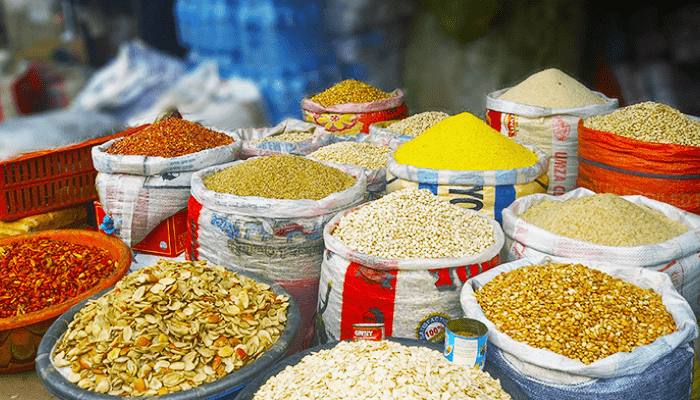2022 might go down in the history of Nigeria as one of the worst years in terms of production and consumption of food as Nigeria has been beset with a barrage of food-production-related crises.
Before now, it was the issue of the high cost of fertilizers for farmers. Then the farmer-herder crisis exacerbated issues for food production. It later graduated to bandits terrorizing farmers, killing, maiming, and imposing levies and taxes on them, with the effect that farmers have been discouraged from plying their trade.
All of that trouble has culminated with a virtual nationwide flood that, according to the National Emergency Management Agency (NEMA), 33 of 36 states in Nigeria have so far experienced the 2022 floods with many of the affected states relying heavily on food production as means of livelihoods.
The floods have so far destroyed over 45,249 houses, while 70,566 hectares of farmlands have been submerged with billions of naira already lost.
All of this comes as Nigeria’s strategic food reserves are not enough to sustain the population for more than one week.
Hitherto, food prices had been rising beyond the means of the common man. The annual inflation rate accelerated to 20.8 percent in September 2022 from 19.64 percent in July, while food inflation rose from 22.02 percent to 23.12 percent in July, with the dwindling value of the local currency.
Particularly, food items such as bread and cereals, food products, potatoes, yams, and other tubers, oil, fat, and other staples continue to rise above the means of ordinary Nigerians.
According to the National Bureau of Statistics (NBS), the food inflation rate stood at 23.34% on a year-on-year basis with a record surge from the 23.12% recorded in the previous month.
Although the minister of Agriculture and Rural Development, Dr. Mohammed Mahmood Abubakar at a briefing to mark this year’s World Food Day said though Nigerians could express concerns over the devastating floods across the country, there should be no panic over threats to food security.
But the government’s response to building farmers’ resilience to recover from the shock of these disasters remains very poor as experts are already projecting higher food inflation as the 2022 harvest draws near.
In the current situation, it poses a bleak picture of how much food will be supplied to the market based on Nigerians’ growing demand.
But the national president of All Farmers Association of Nigeria (AFAN) Arc Kabir Ibrahim, said farmers have to be incentivized to go back to the farm immediately after the flood waters recede.
He said this will enable them to deploy all year-round production as they will embrace climate-smart agriculture, as well as System of Crop Intensification(SCI) which uses less chemical fertilizers to optimize their productivity.
He said, “The government is already releasing food items from the strategic reserve even though the reserve is not adequately stocked to have any significant impact.
We need to invest more in production as the inflationary trend is global and the need to look inwards for food sufficiency is absolutely necessary”.
The Food and Agriculture Organisation of the United Nations (FAO) deputy-director, office of emergencies and resilience, said that it will support Nigeria to make a difference in the life of those that are in the rural areas, mostly neglected smallholders farmers as he described food crisis as trying times.
He said, “As you know the shocks are increasing, and they are cascading, whether it’s climate-related, one time you talk about drought, then suddenly we are talking about floods, then there are displacements due to conflicts and these are compounding to impact on these poor farmers.”
Dr. Umar Bashir, an economist, and social affairs analyst told NATIONAL ECONOMY that the federal government can and should act wisely to mitigate the looming food crisis by opening the borders and allowing duty-free importation of food.
Bashir cautioned that the flood is not likely to recede until November, adding that the time to act is now.





